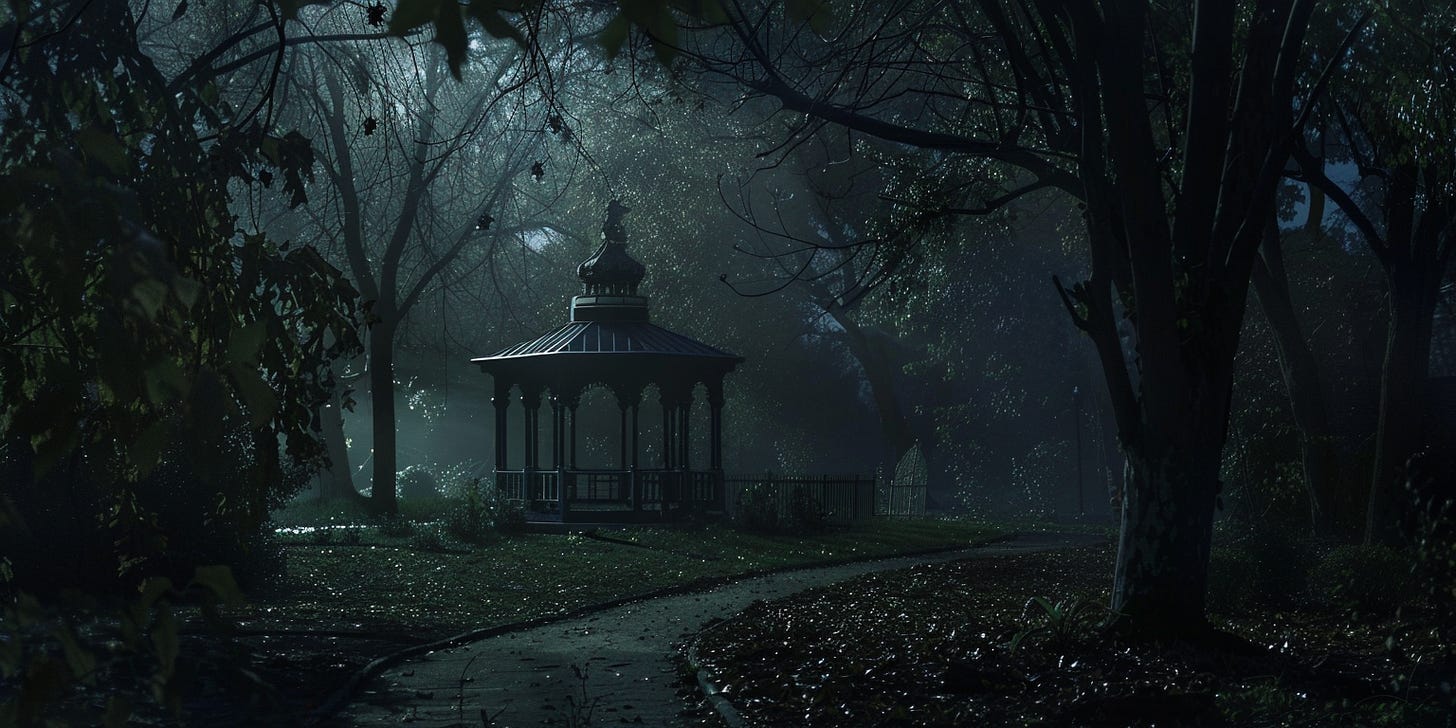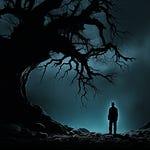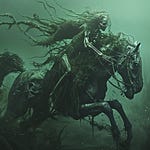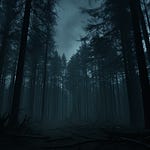On a hot night in August, with my head splitting open, I went for a run.
Most people prefer the daylight, the birds singing and the sun on their necks, but I like the quiet brought on by nightfall, especially around the pond by my house, where folks rarely venture after dark.
My mother has repeatedly begged me not to run at night. On our weekly phone calls she says it’s no time to be out of the house alone. “For heaven’s sake, Sam,” she said earlier that night, “I have enough to stress about with your sister. Don’t you watch the news?”
I could see my mother wasn’t going to drop the subject, so I decided to put her mind at ease. I told her I would stop running at night.
“Really?” she asked, surprised to hear me say it.
“If you care this much about it.”
“I really do,” she replied.
“Okay, then. I do, too.”
In truth, she was crazy if she thought I was going to stop running. I needed it more than ever, seeing as a headache had woken up in my head that morning and grown increasingly bitter with each passing hour. By dinnertime I could barely breathe and chew food at the same time; the concentration it took to do both was too much to muster.
I’ve gotten these headaches all my life. They’ve baffled doctors and driven away partners seeking a night of sleep without being jolted awake by pained screams. They get so bad sometimes, dogs bark and snap at me when I pass them by, like they can smell the blood pounding behind my eyes.
So that night in August, despite what I’d told my mother, I ran. I ran because, sometimes, if I run fast enough, I can leave the headache behind, like a lost child sitting on the curb. But the pain pursued me aggressively that night. It followed me my entire run, licking at my heels until I could barely keep my feet moving in proper rhythm. The run became an awkward jog at best, punctuated by the small cries that occasionally slipped from my lips. My feet pounded the street, then the trail around Emerson Pond as I tried not to think about the pounding in my head.
The pond has become my private sanctuary, what with only a few locals bothering to walk the trail, half of which are teens looking to smoke their herbs in private. The pond is nothing special to look at, really, but something beyond the isolation has always drawn me in. I like the area just past the black gazebo best. It’s comfortable and safe; my own corner of the world, tucked away from the eyes and ears that pry.
I’d just passed the gazebo, in fact, when the pain in my temples suddenly intensified. It got so bad I had to stop running or risk falling down. I pressed my fists against the sides of my head as if to hold my skull together, a sailor plugging the leak in a sinking boat. My brains felt as if they would erupt from my ears and ooze down my running clothes if I took my fists away for even a moment.
My vision swam. I choked on the night air, sputtering and coughing and spitting up droplets of mist that hung for a moment in the pale yellow light. My head felt like the sound a knife makes when it’s dragged across the sharpening stone.
Right about the time I finally took a breath, forcing the night air down into my burning chest, I heard the baby crying in the trees.
The noise was like a bucket of cold water to the face. I squinted between the trees and into the pool of shadows, dissecting it with my eyes. I couldn’t see past the first row of trees, and yet the cries were as loud as if I were standing next to a crib.
The agonizing cries of a baby. Primal and raw.
I thought of the homeless people that sometimes lived in the parks, addicts and other unfortunates. I see them sometimes, stealing away to their hiding places when they think no one is looking. They’ve been dealt a poor hand, and played it as well as could be expected. Like other people I look the other way when they come around with their hands out, mostly because to stare too long, to look too closely into their eyes, affords me uncomfortable views of myself.
Catching my breath, with the din of cricket chirps pressing down on me from all sides, I listened to the crying in the trees. The screams for help. I thought if I stood there a while, if I waited long enough, someone would pick it up, comfort it and stop it from crying. I figured they were likely far more scared of me, a citizen who might call the police, than I was of them.
But the crying didn’t stop. It continued unaided, and if anything grew in desperation until even the oppressive buzz of the night insects bowed under its weight, and all that could be heard were the shrill wailings of that unseen child.
I could stay quiet no longer. “Is someone there?” I finally called out. But the only reply was more crying, more wailing. If there was anyone else present they weren’t making themselves known.
Deciding I’d had enough, I pulled the phone from my pocket and dialed the police. After giving a brief description of my location to the operator, I told the gravelly-voiced woman what was happening.
“A baby?” the operator asked.
“That’s right.” Although the headache had receded to the back of my mind, I still felt it poking around back there; a ghost floating in my peripheral. An echo in the bone. “Can’t you hear it?”
There was a pause on the line as the operator listened, then: “I’m afraid not.”
I huffed into the night. “That’s ridiculous, it’s louder than-”
I stopped talking. I stopped because I realized the crying had fallen silent. Only the insects were screaming now, their leg sounds accompanied by the soft lapping of nearby pond water.
“Are you there?”
“Uh … yes. Yes, I’m here.”
“Do you want us to send an officer? A patrol car can be there in a few minutes.”
I listened again to the trees, but they were as silent as empty graves. How embarrassing. I felt like I’d brought my car in to be serviced, only to have the problem disappear when I explained it to the mechanic.
“If you’re still there I need you to say something.”
“Sorry. Yes, I think you should send someone. I know what I heard, but I can’t-” It was so dark out there. “-I can’t go in there.”
“That’s fine. Stay put and an officer will be there soon.”
“I’m okay. I’ll be okay,” I said, more to myself than the operator. She offered to stay on the line but I declined, assuring her I would keep my distance until the officer showed up. As I hung up the phone and returned it to my pocket, the bushes beneath the trees shifted. They rustled as if disturbed by something- or someone.
“Who’s there?” I called out. I waited a heart-pounding moment. Then:
“Ssaaammm,” a voice oozed from the shadows, and I froze. I wanted to back up, to walk away, to run, but my legs had gone icy cold.
“That’s … not my name,” I said, trying to keep my voice from wavering.
“Sam Stewart of Marigold Street,” the voice said. It was a wet, stinking sound, like an untreated lung infection. I couldn’t pick the voice apart enough to tell if it was a man or a woman. I tightened my hands into fists and willed myself to stay strong.
“Who are you?”
“Why, I’m an old friend. Don’t you recognize me?”
My mind raced. Did I really know the unseen person, or were they toying with me? Of course there was a third option: that they were insane. A stalker who knew me even if I didn’t know them. “I can’t see you,” I replied.
The wet voice laughed at me. The sound was like an intestine being cut in two, almost a woman’s voice, but old and sickly, with a throat full of teeth. “You don’t need to see me to know me. You only need to feel the pain in your skull.”
I nearly cried out. How did they know about the headaches? Was it like the dogs, picking up the scent of my pain? “The police will be here any minute,” I managed to say, trying to sound intimidating.
“And why would they do that, Sam Stewart of Marigold Street?”
“Because I called them.”
“Oh? With what?”
“What do you mean? With-” My hand shot to my side, feeling the outside of my pocket, then diving in to check it. There was no phone there. Nothing but a set of keys. I searched my memory but I couldn’t remember grabbing my phone before leaving the house. And yet I’d spoken to an operator, I was sure of it. I’d had a full conversation with a woman who …
Who …
The laugh came again, bubbling up from the dark like a cobra thrashing in blood. “The senses can be so deceptive,” it said as it leaned forward from the shadows, finally showing itself to me. “But memory. Oh, sweet Sam, memory is no better.”
The face in the trees, lit by the pale light of a waning moon, was like staring into a nightmare. A thing at once both palpable and impossible, a cesspool of violence and rot. It evoked a thousand images of dying animals, teeth grinding and fever screams, car accidents and napalm flesh. I saw everything and nothing in the shapeless form of that face, a wound opened up to share its sights. I felt its eyes crawl up my face like half-dead vines and grow in the pools of my sinuses, nesting in the crooks of my mouth.
“Do you remember me now, Sam?” it asked, the voice moving through my veins like an aqueduct, a sewer of black sludge running through my life. Years of pain and fear recalled in a single moment.
I stumbled back as if suddenly remembering I was in possession of legs. Then I ran as hard as I could, stumbling over myself to escape that place, to put it behind me and not look back. Not ever look back.
“Don’t you want to save the child?” the face in the trees called after me.
I reached my house a few frantic minutes later. The distance hadn’t calmed my nerves, nor had all those glances over my shoulder to make sure I was alone. I clawed the door open like my back was on fire and threw myself inside, slamming it shut behind me so hard I thought it would crack the frame.
My clothes were soaked with sweat. I fell on my phone and called the police. Before the other end picked up, I briefly wondered if this time the call was real or if it was another false memory. No use thinking like that, I decided. But what would I say to the operator? Would I tell them about the baby’s cries? About what I’d seen in the stranger’s face?
Was it even a face that I’d seen?
I had no time to decide. The operator picked up and asked me the nature of my emergency. I was relieved to hear the woman’s voice sounded nothing like the previous one. Hers was a vaguely southern accent, like a rest stop diner waitress.
“H-hi,” I stuttered. “I just wanted to …” I started feeling silly the moment I tried to put the experience into words. How to explain the intangible? How to boil down a thousand fears into a handful of sentences? “I … I don’t know if I’m calling the right number to be honest.”
“What seems to be the problem?”
“I was just running by the pond … Emerson Pond …” The words gave me chills now. “There was someone there who … who looked suspicious.” As the word slipped from my mouth I wanted to slap myself for saying it. Suspicious? Why was I so embarrassed to tell the operator the truth? Was I afraid of being mocked, ridiculed? Called crazy by someone I’d never met? “I’m home now,” I added for some reason.
The operator did her best to extract the information from me, but she had her work cut out for her. “Can you describe the person you saw?” she asked.
Ulcers. Infections. Rotten eggs. Burnt meat and undercooked fish. Flies buzzing in bile. Neglected sewers of an ancient city teeming with-
“I’m sorry, I didn’t- I couldn’t see her face,” I replied.
“It was a woman?”
“I … I think so. I didn’t see what it- what she was wearing. I’m really sorry.”
“That’s perfectly alright.”
The operator was patient with me, professional and thorough. But when I hung up a few minutes later, with her promising that a patrol car would be sent around to investigate, I didn’t believe the woman had any such intent.
It was a long night, made longer because I didn’t sleep a minute of it.
As the clocks in the house ticked on like centipede legs, I lay in bed with my eyes open. I stared at the television on the opposite wall. And yet I had no idea what was playing, or even in what language the thing had been broadcast. The only images in my mind came from my memories of Emerson Pond. Poorly recollected moments of anxiety and disgust.
But memory. Oh, sweet Sam, memory is no better.
When the sun came up for air I took a shower and called the office to let them know I wouldn’t be coming in. I made up something about being up all night throwing up, which was as close to the truth as they were going to get out of me. They only gave me a little grief, being that I rarely called out, and I’m sure I must have sounded terrible after the night I’d had.
A lack of sleep wasn’t the real reason I called out, however. I’d pulled all-nighters before and gone to work fine the next day. I have that in me. The real reason was that, halfway through the night, I’d decided to return to the pond.
To the place with the black gazebo.
To see the face in the trees.
It was a crazy idea and I knew it. I had no delusions otherwise. However I knew my mind wouldn’t allow me to move on until I cleared up the mystery of exactly what had happened to me. I have that in me as well. A drive that drives me mad. A longing to know the deeper and the darker.
I’d thought of going back with someone, safety in numbers and whatnot, but I gave up on the idea when I realized there was no one to go with me. I have one sibling, a sister who lives nearby who also has a newborn to worry about. All of my friends are casual acquaintances at best, no one I’m really comfortable calling on unannounced, let alone dragging into my unfolding nightmare.
It’s a thought I don’t like to dwell on. The loneliness. The fact that the only people I speak to are co-workers I tolerate and a mother who tolerates me. And so I decided the next safest move was to go back to the pond during day, when more people were around.
When the sun is out, the shadows keep fewer secrets.
The pond looked harmless in the day. Lit by the glow of the summer sun, moved softly by a cooling breeze, it could almost be mistaken for a peaceful place, a place where nothing awful happens. A simple pond where things don’t peek out from the brush and call out with whisper-wet voices.
A few people were walking its trails that day, seniors, mostly, on account of being a work day. A group of ducks was even making the most of the good weather. They splashed and quacked and bobbed for small fish at the center of the pond as if they weren’t the most ridiculous of God’s inventions.
I walked slowly but steadily along the path. Accustomed to visiting it at night, I was surprised to see how much sunlight filtered through the canopy of leaves and lit up the dirt path. Yet it was tainted to me, stained dark by the events of the previous night, and even where the sun touched it the earth seemed cold and drained of blood.
I caught sight of it as I rounded the bed. The gazebo was an organized pile of old wood, chewed on by termites and worn down by rain. It had seemed quaint to me once, a relic of simpler days. Now it was a hornet’s nest that glistened with wood pulp and saliva.
Carefully, as if my eyes might become trapped by too long a look, I glimpsed at the place in the trees where I’d seen that vile face the night before. My mind attempted to make shapes where there were none, assembling the various shadows and branches into silhouettes. A false recognition of patterns. A bad puzzle-solver shoving pieces together that didn’t fit.
The truth was, there was nothing there. No silhouette, no grinning nightmare face, just trees and brush and the vines that choked them. Emboldened by the simple signs of nature, I approached the place in the trees that had wholly occupied my thoughts since my last visit. It wasn’t enough to see it from a distance, I needed to fully remove all doubt from my mind if I was to return to my life with a clear conscience and a satisfied curiosity.
What ground I could see was normal enough, the usual layers of old, fallen leaves and bits of bramble and rock that covered much of the property surrounding Emerson Pond. The most shocking thing there was an ant carrying a half-dead moth on its back; a proud offering to queen and colony alike.
There was also a strange smell permeating the air. A lingering dampness seemed to have settled over the ground there, the sweet remnants of decomposition, perhaps from some long gone animal that had crawled into the brush to die alone the way some do. At least I hoped that was the explanation.
Even then, as I tried to convince myself of the story I’d invented, I felt the rising tide of pain in the depths of my skull. I could tell the headache was going to be particularly bad. The air, so ripe with decay, grew thick with the metallic smell of blood, and the trees pitched and swam and reached for me with crooked arms. I felt the sensation of wind on my face and the taste of grass, and then, finally, nothing.
Gently, lovingly, my mother stroked my hair. I was safe in her arms, and the headache was gone. She knew just how to coax me to bed, a deep sleep that eased my pain and took away all tension and doubt. Cradled in protective arms like a small child or a-
Baby.
My eyes shot open to the cancer that held me. A face of slipping sludge, a crown of bloodied hands and insect mandibles. Sucking sewer grate eyes held me in their bruised stare. A mouth like a puncture wound opened to smile down at me, a thousand tongues sliding over broken bone.
“Welcome back, Sam Stewart of Marigold Street.”
My legs didn’t work. Wouldn’t work. I gripped and clawed and crawled away, dragging useless feet behind me, calling for help with a hoarse, itching throat. It was night, and the shadows had returned.
“They can’t hear you,” the face in the trees bubbled. “They couldn’t remember if they did.”
I squeezed and beat my legs to feel something but to no effect. I spun to face it. The face hadn’t moved, and yet I feared it no less. Unseen fingers pressed into my skull like a child dipping into finger paints. I squinted tightly, trying to force them out, but they only wormed their way further in.
“What are you?” I asked. “What do you want from me?”
“You returned to me,” the voice bled.
“I … I heard a baby. I need to know if it’s-”
The word died in my throat, as if saying it aloud would make it true. Just the thought alone was unbearable, and the shadowy fingers shivered inside my skull.
“Why didn’t you tell them?” it asked.
“Who?”
“The police. The call you made when you got home. Why didn’t you tell them about the child?”
My eyes fell to my deadened legs. “I … didn’t think they’d believe it.”
A laugh came. “No, sweet Sam. You were scared to tell them what you’d done.”
I blinked tears away. “What are you talking about?”
“You brought her to me, just like you brought the others.”
“I don’t-” Before I could protect myself from the assault, faces began flashing through my mind, each one like heat lightning searing my eyes. Men and women alike, fed stories and lured into the woods. Children pulled from the street and dragged from their homes. Babies taken from-
“Stop it!” I felt as if my vocal cords would tear, and yet I wasn’t sure I’d even made a sound. The strings in my mind were being played so masterfully, so brutally, I wasn’t sure of anything at all, not even the things I said.
“Do you want their names, Sam Stewart?” the voice teased.
“This is a trick. Like the phone call. You’re making this up, making me see things that aren’t there.”
“I didn’t invent anything, Sam Stewart. You did call the police, almost a year ago now. I just made you remember it. I help you to remember, and I help you to forget. Sometimes you wake up. Sometimes you run. But always you come back.”
I shook my head fiercely. “No. I don’t believe you.”
“You don’t have to. Soon you’ll forget everything you’ve heard here, everything you’ve seen. Even my pretty face. You’ll go back to your dull house and your dull life as if nothing happened. But one night, one night soon, you’ll come back to me. You’ll come back and give me what I need. And I will take your offering, as well as your pain, and I will swallow them both.”
“There’s no way I could forget this.”
“You will. You have. Your sister recently had a child, did she not?”
My stomach twisted, a spiral of dread pulling at my center. “No.”
“A newborn. So young, so sweet.”
“Never.” My toes twitched and knotted as the face moved forward from the trees. Wet shadows burst and bled, pouring toward me like a lanced boil. Thick, black hunger and hatred, a million years of decay, washed over the grass and dirt and the things that crawled and died in them. A jolt of horror shot through my body with such intensity I felt it in my crippled legs.
“You say many things, Sam Stewart, yet you think others. You hate your sister. You hate her child. Your mother always preferred her over you. Until she died, that is, until the moment you smothered the life from your mother in that hospital room.”
My legs, alive again, kicked out at the drowning shadows, and then I was up, up and running, lungs burning air, unblinking eyes peeled wide as my chest rose and fell, feet running on dirt and then concrete as I left the pond and the nightmares behind. I felt fingers draw out of my skull and take something with them. My feet pounded the cooling blacktop as I pushed myself hard, running toward home, house after house, street after street.
By the time I got home my headache was gone and my heart-rate had leveled out. Another good run in the books. I’d run that path around the pond so many times I barely noticed it anymore. But then I suppose that’s just how things are: we forget so much more than we remember. I had the feeling I’d forgotten to do something, but the feeling soon passed, so I took a shower and got ready for bed knowing I would sleep well after such a strenuous run.
I have a good life. It’s a bit lonely sometimes, but it’s good. I have a sister who I see every so often. She had a child once, a girl, but it didn’t live long. At least my mother wasn’t around by then to bear that heartache.
The only complaint I have is the headaches. Some days I get them, some days I don’t. But a good run always makes me feel better in the end. There’s a pond nearby I like to visit, with a nice path and an old, black gazebo nestled in with the trees. That’s where I go when I need to feel better. My own, special place.
On a hot night in August, with my head splitting open, I went for a run.
This story appears in An Echo in the Bone, a collection of twenty short horror stories. You can purchase it on Amazon or subscribe below to receive the ebook for free.















An Echo in the Bone